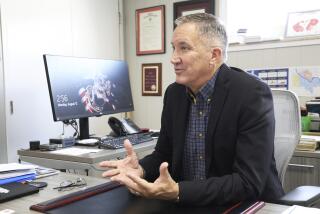Huckabee’s double-edged faith
- Share via
ARKADELPHIA, ARK. — Five days after the tornado tore through the state, this city of 10,000 lay in ruins. The cyclone destroyed an office building, a bank, a pharmacy and 70 other businesses. The electricity was out. The National Guard patrolled the streets. Six people were dead.
In Little Rock, GOP Gov. Mike Huckabee was reviewing a disaster insurance measure that he intended to support when he became troubled: The bill, drawing on centuries-old legal terminology, referred to natural disasters as “acts of God.”
In a time of emergency, Huckabee would hold up the measure for more than three weeks to press his personal objection that the Almighty could not be blamed for the region’s loss. In the process, he drew damaging headlines and created new strains in his relations with the state’s legislature, the General Assembly.
Today, a decade later, Huckabee’s religious faith is taking new prominence as voters in Iowa prepare to cast the first ballots of the 2008 presidential contest in Thursday’s caucuses. Huckabee, a former Southern Baptist minister, has sprung to the front of the Republican pack with an appeal built largely around his claim that his Christian faith “defines” him.
If voters want to know how his faith would influence his presidency, “the best way to look at it is how I served as a governor,” Huckabee said Sunday on NBC’s “Meet the Press.” “I didn’t ever propose a bill that we would remove the Capitol dome of Arkansas and replace it with a steeple. You know, we didn’t do tent revivals on the grounds of the Capitol. But my faith is important to me.”
Huckabee’s tenure as governor, 1996 to 2007, shows that his faith sometimes created political burdens for him, turning minor issues into public controversies and exacerbating tensions with other state leaders.
Huckabee at times seemed too biblical even for fellow believer-politicians in the Bible Belt. In the “acts of God” dispute, there is no indication that anyone was harmed by the delay, but some felt that the governor’s religiosity, as politically expressed, came close to pettiness.
“ ‘Petty’ is the best word to describe him,” said Dennis R. Young, a state representative at the time who sponsored the relief measure and had been an early Huckabee supporter. “In these kinds of things, he’d make mountains out of molehills.”
--
‘My standard is Christ’
From his first day in office, Huckabee emphasized his faith. His inaugural day began with a prayer service at a Baptist church in Little Rock that Huckabee would recall as “almost like an ordination service.” He described himself as a “servant leader” in the biblical tradition and banned smoking and swearing in the governor’s office.
“My standard is Christ,” he wrote in “Character Makes a Difference,” published this year. “I will have to answer to him alone.”
Huckabee, 52, has argued that his pastoral background helped him get some things done. He helped create a nonprofit foundation to enlist churches in moving families off welfare. After Hurricane Katrina hit neighboring Louisiana, his connections to ministers around the state hastened the opening of dozens of church camps to evacuees.
He cited God in explaining his special outreach efforts to African Americans. He invoked the Christian notion of stewardship -- that “ ‘the earth is the Lord’s,’ and that we are not its owners, merely its caretakers” -- in promoting a tax increase to fund parks and conservation.
And by his account, his faith deeply influenced his policies on abortion. Under Huckabee, the state banned late-term abortion procedures and unsuccessfully challenged a federal rule requiring Medicaid coverage of abortions for rape victims.
“When I became governor of Arkansas in 1996,” he later wrote, “I recognized the same moral authority -- God’s authority -- that I did as a pastor. . . . I not only want to know Him, I want others to be able to see Him through the decisions I make and by the way I make them.”
In time, there was a backlash. In 1998, the Arkansas Times, an alternative weekly, ran a political cartoon of the state Capitol covered with a revival tent. Critics referred to Huckabee dismissively as the “Rev.-Gov.”
And his judgment was strongly questioned after he publicly signaled an interest in granting clemency to a convicted rapist, Wayne DuMond, who had said he found religion in prison. Though it was the state parole board that opened the prison door, some board members said Huckabee had pressured them to release DuMond. DuMond was later convicted of killing a woman after his parole. Huckabee has denied applying pressure.
At times, those around him bristled at his biblical references. Huckabee was forced to apologize after suggesting environmentalists worshipped Earth instead of God. Legislators took offense when Huckabee was quoted in a 1998 church publication as saying, “As a pastor, I was surrounded by the things, the people, the language and the architecture of God. As governor, I’m surrounded by the devil.” Huckabee said he was talking about social problems, not lawmakers.
--
A storm stirs
For those who believe Huckabee’s religiosity was high-handed, there was no clearer example than the disaster relief legislation that came before him less than a week after the March 1997 tornado.
Senate Bill 491 was so straightforward it ran to only two pages. It sought to protect tornado victims from insurance companies that might cancel policies after they filed claims. “No insurance policy or contract covering damages to property shall be canceled nor the renewal thereof denied solely as a result of claims arising from acts of God,” it read.
“Acts of God” had a long history in English maritime law and was standard language in many insurance policies.
The bill had been introduced a few days before the March 1 tornado wrecked more than 250 miles of Arkansas and caused the death of 25 people in all. It was touted by both parties as part of the relief response after the storm, and lawmakers and the governor said the protection was urgently needed.
Arkadelphia was hit hardest. “Everything I remembered about the place had vanished,” wrote Huckabee, who had attended university there.
According to state legislative records, Huckabee first registered his objection to the Senate bill five days after the tornado. But his staff did not relay his concerns, he later wrote.
“While I realize that to some this is a minor issue, it is a matter of deep conscience with me to attribute in law a destructive and deadly force as being an ‘act of God,’ ” he eventually wrote to the bill’s sponsors, Young and Sen. Wayne Dowd. While acknowledging that “acts of God” was the “appropriate” legal term, he suggested the legislature substitute “natural disaster.”
--
Holding firm
He said he would not sign the bill, drawing attack from both sides of the aisle. Democrats argued that the governor was imposing his religious vision on badly needed legislation. Some legislators felt that their own faith was being questioned by the governor. “I’m just as much a Baptist as he is,” one lawmaker said in a legislative session.
Others suggested that Huckabee’s conception of the Almighty was off. One Republican suggested he reread the Book of Job, with its parade of personal calamities. But Huckabee held firm. So did the legislators. The House, which had pulled the bill back, refused to amend it and passed it again, 93-0.
On the floor of the legislature, Huckabee was compared to the legalistic Pharisees in the Bible. Some lawmakers had substantive objections, saying that by not conforming to established language, the legislature could open up a loophole for insurance companies to exploit in court.
Commentators across the state denounced Huckabee. “We would suggest the governor sacrifice a bit of his personal theology for the greater public good. That would be an act of God,” said a newspaper in Texarkana, where Huckabee had been a pastor for six years.
Still, Huckabee would not budge. Five alternative phrases for “acts of God” were proposed and rejected by one side or the other. Finally, the governor and legislature agreed to use the phrase “natural causes.” The bill became law on April 4.
Public records in Little Rock and Arkadelphia show hundreds of disputes between insurers and tornado victims, though there is no indication that the four-week legislative delay harmed victims. Huckabee, who became governor when his predecessor, Bill Clinton, stepped down, won a full term the following year and reelection in 2002.
Longtime Huckabee friend Jonathan Barnett, who was made available by the Huckabee campaign to answer questions on the candidate’s record, said he did not think the governor had any regrets about the matter. He also said Arkansas media and some legislators made more of the incident than it merited.
“I think he was just making a comment about his views,” Barnett said of the governor.
Huckabee had won the “acts of God” dispute, but the incident established a pattern for bitter fights over details. “Instead of getting focused on getting aid to the areas, he’s in an uproar over words,” said Sen. Percy Malone. “It was kind of silly.”
Malone notes that the dispute got little attention in Arkadelphia as it was happening, for a simple reason: Electricity was not restored until after the controversy had passed.
--
More to Read
Sign up for Essential California
The most important California stories and recommendations in your inbox every morning.
You may occasionally receive promotional content from the Los Angeles Times.










